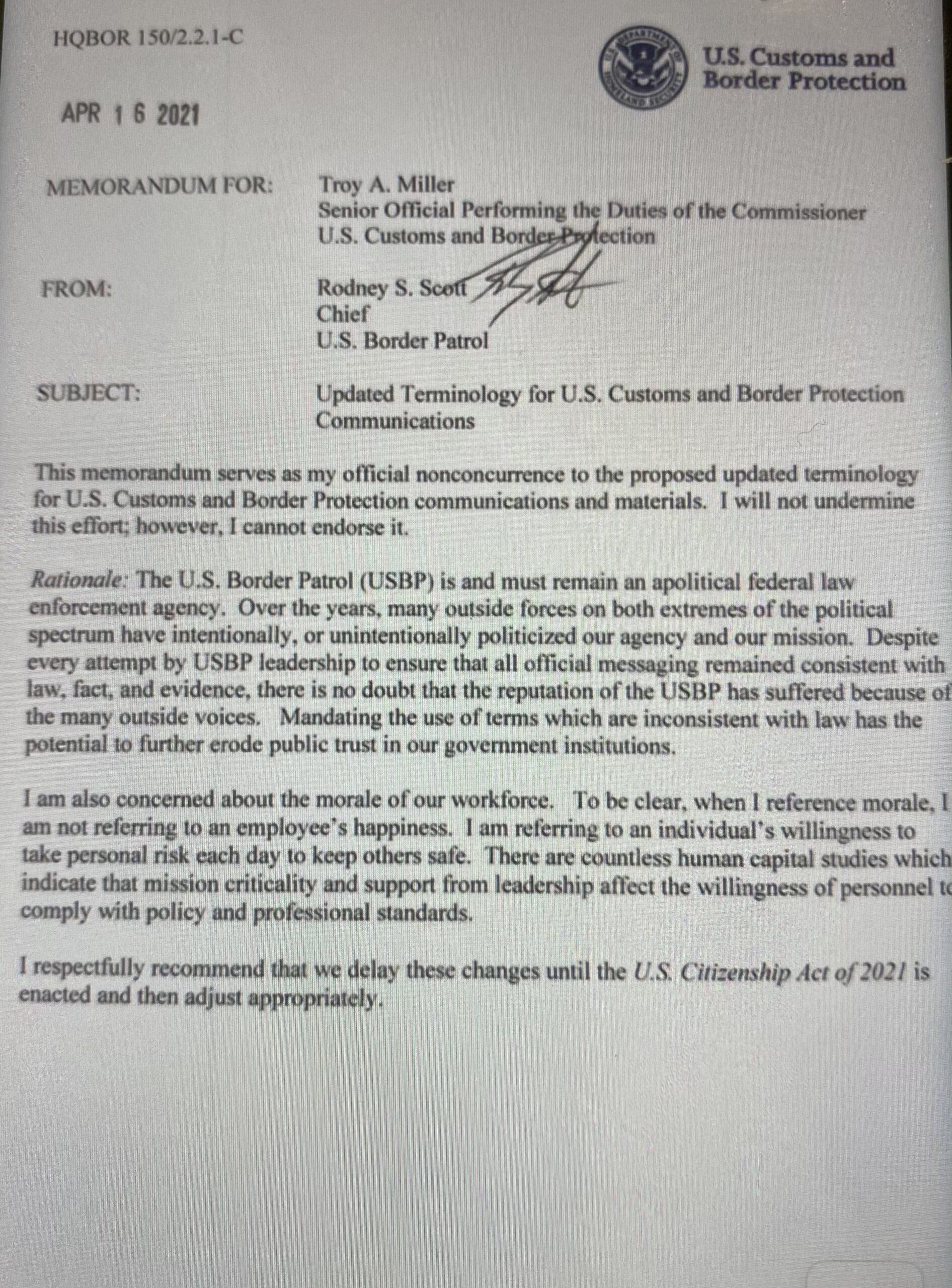The head of the U.S. Border Patrol privately rebuked a senior homeland security official over the Biden administration’s order that federal law enforcement stop using the term “illegal alien,” according to an internal document leaked to the Washington Examiner.
Ahead of an April 19 announcement from Troy Miller, the temporary leader of U.S. Customs and Border Protection, the Border Patrol’s national chief, Rodney Scott, sent an internal memo to his superior, criticizing the decision to replace immigration terms with ones seen as less offensive.
“This memorandum serves as my official nonconcurrence to the proposed updated terminology for U.S. Customs and Border Protection (CBP) communications and materials. I will not undermine this effort; however, I cannot endorse it,” Scott wrote in a letter to Miller on April 16. Three sources confirmed the memo was legitimate and that Scott had sent it.
“The U.S. Border Patrol (USBP) is and must remain an apolitical federal law enforcement agency. Over the years, many outside forces on both extremes of the political spectrum have intentionally, or unintentionally politicized our agency and our mission,” wrote Scott, an agent of 28 years who took over the 20,000-person organization in early 2020. “Despite every attempt by USBP leadership to ensure that all official messaging remained consistent with law, fact, and evidence, there is no doubt that the reputation of the USBP has suffered because of the many outside voices. Mandating the use of terms which are inconsistent with law has the potential to further erode public trust in our government institutions.”
UNPRECEDENTED BORDER CRISIS TAKES OVER BIDEN’S FIRST 100 DAYS
Scott said the federal agency ought to wait until President Joe Biden’s U.S. Citizenship Act passes Congress, then revise internal policy.

One person said Scott was “not the only” senior Border Patrol official who objected to the change in closed-door leadership meetings ahead of the announcement. Scott is not a political appointee and could be on the chopping block come mid-May, when the 120-day waiting period on terminating senior executive officials in government ends. He did not respond to a request for comment, and a CBP spokeswoman declined to comment on the memo.
On April 19, Miller told CBP’s 60,000 personnel to stop using the terms “illegal alien,” “alien,” and “assimilation.” The change represents an attempt by the Biden administration to get rid of decades-old legal terms that were used by Republican and Democratic administrations but are seen by liberals as inhumane. Employees were told to start using “noncitizen” or “migrant” for “alien,” “undocumented” for “illegal,” and “integration” for “assimilation.”
CBP regularly uses the term “illegal alien” in its news releases and on social media when talking about incidents at the border or inside the United States. Officers with CBP’s Office of Field Operations work at the land ports of entry, while its Border Patrol agents apprehend people who illegally come across the border between those ports.
In January, Rep. Joaquin Castro, a Texas Democrat, reintroduced the Correcting Hurtful and Alienating Names in Government Expression Act to prohibit the federal government from using “alien” when referencing a person who is not a U.S. citizen or immigrant because it is “derogatory.” Castro’s bill is similar to Biden’s proposed U.S. Citizenship Act, which calls for “alien” to be changed to “noncitizen.”
Rep. Henry Cuellar, a senior House Democrat from a border district in Texas, said last week that he plans to continue using the term “illegal alien” despite the Biden administration’s order that federal immigration agents drop it.
“I can understand some people are trying to be a little bit more politically correct, but if you look at what the statutes say, they do use the word ‘alien.’ That’s what the statute does, so, until the statute changes, some of us will continue to be using the word ‘alien’ on that,” Cuellar said. “I don’t think the statute is going to be changed, but I can understand that thinking of some folks,” said Cuellar, the vice chairman of the House Appropriations Subcommittee on Homeland Security. “That is the word that’s in the statute until we change that.”
CLICK HERE TO READ MORE FROM THE WASHINGTON EXAMINER
Scott also told Miller that he was “concerned” about agents’ “willingness to take personal risk each day,” adding that employees’ willingness to adhere to policy and professional standards is affected by leadership’s support.
